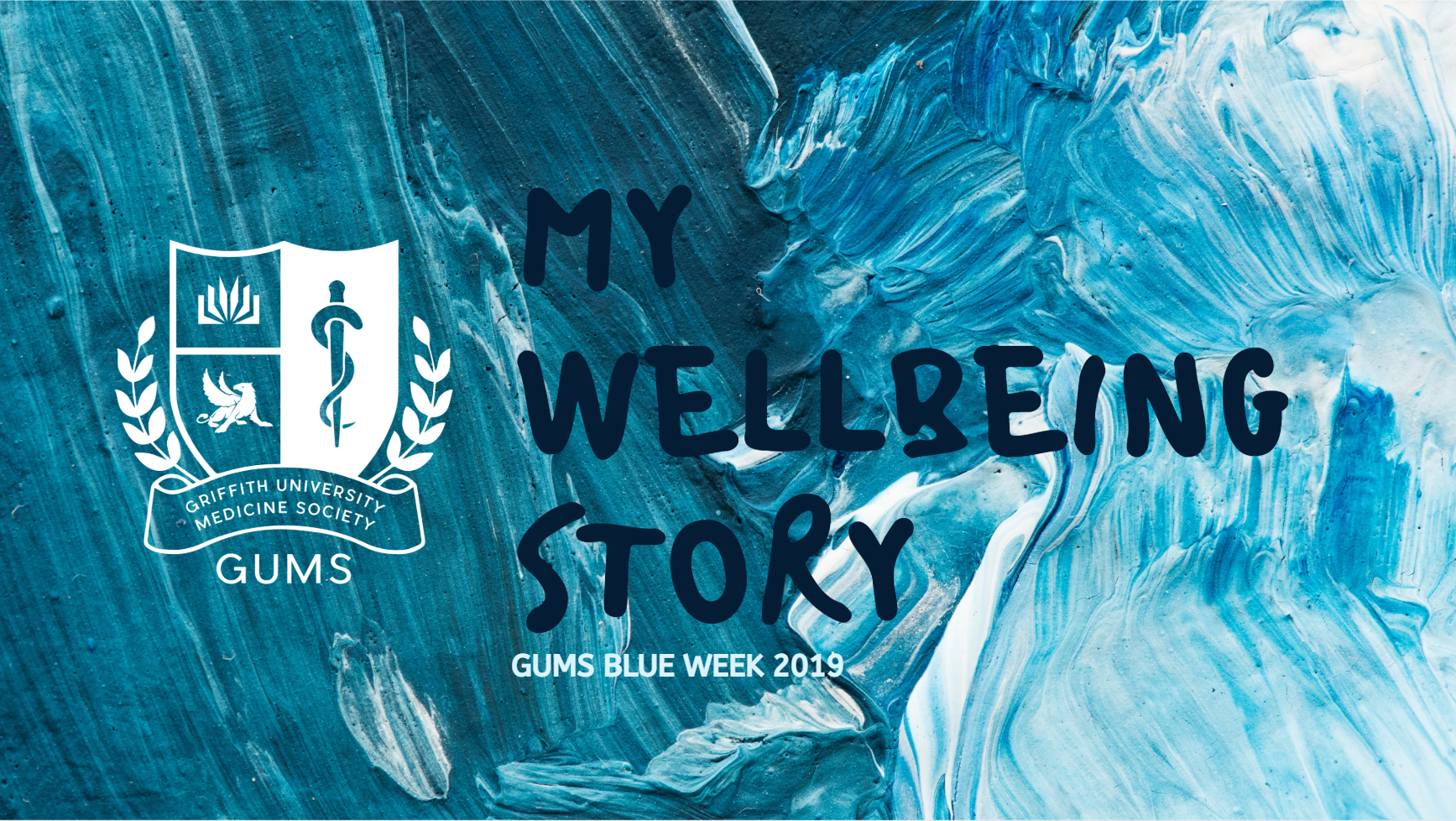
25 Jul My Wellbeing Story: YEAR 3, 4 + BEYOND
This Blue Week, we asked people at different stages in their medical career, to share their personal Wellbeing Stories unique to the current context of their medical careers. Through various stages of medicine, we all face our own unique challenges and although it may sometimes feel like we are all alone or the only one struggling, this is often the furthest thing from the truth. Each of us has a Wellbeing Story that describes the challenges we face and how we approach them. Sharing these stories creates a community that is positive, understanding and supportive as we work together to create a healthier environment for health professionals. As you navigate your own challenges, we hope these stories encourage you and empower you to talk and share with others.
If you, or someone you know, needs help please contact:
- Lifeline
- 13 11 14
- Beyondblue
- 1300 22 4636
- Eve De Silva (Griffith University School of Medicine)
Year 3 + 4
Clinical years are an exciting time of growing in skills and confidence. Here are some stories from our third and fourth year students.
Story 1
The transition from the preclinical to the clinical years of medicine has been a huge learning curve. It was not easy being suddenly thrust into a brand new environment with no clinical experience and little certainty as to what was expected from us. On my first day of placement this year, I was given my own consult room and told to see patients by myself, and as the surgical fellow put it, “get in there and learn by doing!”. I always knew third year was supposed to be the most difficult and longest year of medical school, and honestly, I didn’t know how I would find the transition. Before my placement, I used to worry about whether I would enjoy my time in the hospital and whether I was good enough to be there. But once I got there, I found that it was not the big scary nightmare I worried it would be. While I did make mistakes, I took it as an opportunity to learn from them- learning to be okay with making these mistakes is one of the most important things I have learned this year. Being a self-confessed perfectionist, this is not an easy thing to do. I’ve also learnt to trust in myself and my own abilities in caring for patients. With each day and each encounter I have with patients, staff and other students, I become more confident. These aren’t things that you can learn from a book – it’s something that you gain from experience. While these learning experiences have often come from the mistakes that I have made, by keeping a positive attitude towards them, I know I will continue to improve and grow into a better person and doctor.
Story 2
Year 4 may be the last year of my medical degree, but it is only just the beginning of my medical career. The pressure of being a doctor next year is something that weighs heavily on my mind. I’m unsure on whether I have the capacity to lead. There’s also uncertainty surrounding the location of my placement next year, which makes me wonder how my personal life and future career will look like. It can get quite draining thinking about all of this while also juggling the other commitments of medicine, such as learning content for exams. Graduating at the end of this year, I will have outgrown the label of being a medical student, but I will not have earned the title of doctor just yet either. The weird limbo of not truly belonging to either label makes me apprehensive of where I stand. However, I allay my worries by recognising when I am thinking too much about the future and then bringing myself to the present. This helps me focus, become more efficient as a doctor and become much more calmer as a person.
Story 3
I anticipated that there would be things I would forget or not know, even in my final year of medical school, but the realisation of how close to becoming a doctor I am – with the inherent responsibility over people’s lives – has, at times, made me worry and wonder if I’ll be ready for internship. When I am unable to perform a certain skill/answer a certain question, I used to replay the event in my mind and spend time hypothesising what the consequences would have been if I was already an intern. I would also often course-correct by trying to answer or do something I knew well at the next available chance. However, nowadays when I am faced with a situation where I don’t know something, I assess whether it is something I am expected to know- if it is, then I make a note and make it a learning/revision point. If it isn’t something I was expected to know, I accept it for what it was and make the effort to learn it for the future. I’ve also found that my faith helps me to compose myself and prayer especially helps me to remain positive. As a whole, this year has taught me to adopt an attitude of growth where I look at my knowledge/skill gaps as learning points rather than personal failures. Whenever I do feel discouraged by an event, I’ve been able to ‘bounce back’ and move on by being proud of what I did know or was able to demonstrate competently. I’ve come to the understanding that, at every level, there will be areas of medicine that I will forget or not know.
Postgraduate Years
Story 1
As an Intern in a brand new hospital and a brand new city, there was a lot I had to get used to. Beyond just the stress of making new friends and setting up my life, I was learning to navigate and make decisions within a hospital system. As a student, you are not directly responsible for much, but as an intern you take on new responsibility and this is quite daunting. Although I had anticipated that this would be difficult, I didn’t realise how significantly it would affect me. I found myself laying awake at night, mulling over decisions I had made in regards to patient management and hoping that my contribution to my team was useful and not detrimental. I started to question my skill as a doctor and wonder if I was meeting the expectations. I realised this was eating me up inside when I started to feel increasingly nervous at work. I knew that I had received good medical training, I knew that I was not a bad doctor- why couldn’t I get out of my own head? I had a conversation with one of the registrars who empathised with me and let me know that everyone goes through these same feelings at various points in medicine. He reassured me that I was doing a good job and that, with time and trust in myself, I would grow in confidence. Now when I hear that voice in my head questioning my aptitude, I counter it with objective facts like, “my reg wouldn’t let me manage this patient if he thought I wasn’t capable” or “I have been taught this procedure and done it well many times”.
Story 2
Working as a non-accredited registrar for quite some time in one department, I feel like I’ve stagnated in terms of how much I can and will progress. While I know my place is to support the training registrars, there is an inherent cap on how much I can do and how much autonomy I get. Dealing with a change of career away from surgery, I realised that I’ve always loved the work, but I never once stopped to think about my non-work life up to this point. Or how much I need to be a fully-functional human being; not a robot or a shell of my former self. Knowing I have the aptitude to do something but taking a step back and walking away from it in order to save myself has been a humbling and incredibly conflicting experience. The first sign that my life needed re-evaluation was when I noticed that I was getting angrier and angrier and taking it out on those around me. One day the clinic nurses sat me down and told me my personality had changed – and not for the better. Getting angry easily is one of the telling signs I am starting to “fall into the hole again”, as is the re-emergence of some of these weird compulsive behaviours that I have developed. My husband tends to notice these before I do. Another tell-tale sign is if I can’t fall asleep during my on-call and instead start online shopping at 3am! The best thing I did was get external help. The best thing I did was getting external help. I talked to my Head of Department and he gave me some time off to recharge and get my mojo back. Speaking to those that have been in my shoes, not only did I receive valuable career advice but many of the bosses (even in surgery!) admitted that they had felt the same way at some point. Knowing that it’s a common occurrence and that I’m not alone has been reassuring, especially in the darkest of times.
If you would like to talk to someone about the content of these stories, please message Janis Fernandes (j.fernandes@gums.org.au)

